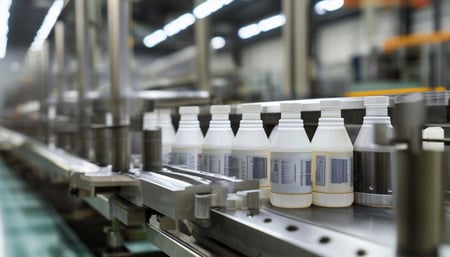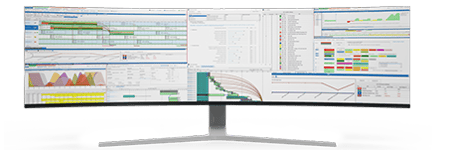Increasing Mass Production Efficiency in Packaging Manufacturing
Mass production remains a cornerstone of efficient, cost-effective manufacturing. However, achieving consistent quality, reducing waste, and meeting customer demands on time can be challenging, especially when production lines run at maximum capacity. Production planners, responsible for optimizing these complex workflows, face constant pressure to deliver on efficiency without sacrificing quality.
This is where the integration of advanced planning and scheduling (APS) tools like PlanetTogether with ERP systems like SAP, Oracle, Microsoft, Kinaxis, or Aveva can be transformative. By streamlining processes, enhancing visibility, and reducing the risk of bottlenecks, this integrated approach enables production planners to make data-driven decisions with precision.
In this blog, we’ll explore how PlanetTogether can elevate the mass production method in packaging manufacturing, leading to streamlined workflows, improved quality control, and enhanced agility.

Mass Production Method in Packaging Manufacturing
Mass production, or repetitive manufacturing, involves producing large quantities of standardized products, typically through assembly lines or automated machinery. In packaging manufacturing, this might mean producing thousands of boxes, containers, or wrappers in a single day. The mass production method is characterized by:
High Volume, Low Variety: Producing large quantities of similar or identical items.
Standardization: Using consistent specifications and processes for efficiency.
Automation and Assembly Lines: Relying on machinery and automation for faster, more accurate production.
While mass production is efficient, it also presents unique challenges for production planners in the packaging industry, including the risk of bottlenecks, quality control issues, and the need to balance inventory with demand.

Key Challenges in Mass Production for Packaging Manufacturing
Demand Forecasting and Inventory Management: In mass production, accurately predicting demand is critical. Overproduction leads to excess inventory, while underproduction can cause delays and missed deadlines.
Minimizing Downtime and Reducing Waste: Consistent output requires machinery and equipment to run smoothly. However, breakdowns and inefficient processes lead to costly downtime and waste, impacting overall efficiency.
Maintaining Quality Control: Mass production runs at high speeds, so identifying and correcting defects early is crucial to avoid producing a large quantity of faulty products.
Flexible Production Scheduling: Demand for packaging materials can be volatile, requiring agile production schedules. Delays in one area of production can cause cascading delays throughout the workflow.
Data Silos and Limited Visibility: Without real-time visibility, identifying production bottlenecks and adjusting plans quickly can be challenging.
![]()

How PlanetTogether and ERP Integration Can Address These Challenges
PlanetTogether is an advanced planning and scheduling (APS) software designed to optimize production efficiency, improve lead times, and maximize resource utilization. When integrated with ERP systems like SAP, Oracle, Microsoft, Kinaxis, or Aveva, PlanetTogether provides end-to-end visibility, real-time updates, and seamless communication across departments. Here’s how this powerful integration can enhance the mass production process in packaging manufacturing:
Real-Time Demand Forecasting and Inventory Management
Integration with ERP systems allows PlanetTogether to access real-time sales forecasts, inventory levels, and material availability. With this data, production planners can:
Adjust production plans based on actual demand, avoiding overproduction or stockouts.
Optimize inventory levels by aligning raw material orders with production schedules, reducing excess inventory and associated carrying costs.
Respond proactively to demand fluctuations by reallocating resources and adjusting production speeds.
For example, integrating PlanetTogether with SAP’s Material Requirement Planning (MRP) module enables planners to monitor demand forecasts and inventory changes in real time, providing a buffer against supply chain volatility.
Maximizing Equipment Utilization and Minimizing Downtime
In mass production, equipment uptime is essential for meeting high-volume targets. PlanetTogether integration with ERP systems enables:
Predictive maintenance scheduling based on usage data and machine performance metrics, reducing unexpected breakdowns.
Efficient scheduling of machinery and resources to ensure optimal utilization across production shifts.
Proactive adjustment of production schedules to accommodate equipment downtime or maintenance without halting other production processes.
By linking PlanetTogether with Oracle’s Asset Management or Microsoft Dynamics 365 Maintenance, production planners can develop maintenance schedules based on historical and real-time data, preventing costly downtime and optimizing machine usage.
Enhanced Quality Control through Continuous Monitoring
Quality is paramount in packaging, as defects can have a ripple effect across the supply chain. With PlanetTogether and ERP integration, production planners can:
Monitor production quality in real time, receiving alerts when parameters deviate from set standards.
Identify potential quality issues early to prevent producing large batches of defective products.
Track quality control data across production cycles, identifying trends and areas for improvement.
For example, integrating PlanetTogether with Aveva’s manufacturing execution system (MES) enables continuous monitoring of quality parameters. This integration helps planners to ensure that each batch meets quality standards, reducing rework and waste in the process.
Flexible and Responsive Production Scheduling
One of the greatest benefits of PlanetTogether integration with ERP systems is improved scheduling flexibility. Production planners can:
Quickly adapt to changes in order volumes, demand patterns, and resource availability.
Implement dynamic scheduling that adjusts in real time to prevent delays and optimize production flow.
Balance workloads across production lines, preventing bottlenecks and optimizing capacity.
For instance, with Kinaxis integration, production planners gain visibility into supply and demand changes across the network. This enables rapid adjustments to schedules, so planners can meet customer demands without compromising efficiency.
Improved Visibility and Decision-Making with Integrated Data
Data silos can severely limit a production planner’s ability to make informed decisions. With PlanetTogether-ERP integration, data flows seamlessly between departments, providing:
Complete visibility into production processes, from order intake to delivery.
Accurate, up-to-date data for better decision-making and more effective resource allocation.
Enhanced collaboration between departments, as all stakeholders have access to the same information.
Integrating PlanetTogether with SAP, for instance, centralizes information from various departments, creating a unified data source. This unified data view enables production planners to make informed decisions with a comprehensive understanding of the entire production cycle.
The mass production method has proven effective in packaging manufacturing, but today’s market demands are evolving. The integration of PlanetTogether with ERP systems like SAP, Oracle, Microsoft, Kinaxis, or Aveva offers production planners the tools they need to enhance efficiency, maintain high quality, and respond flexibly to changing demands.
For production planners in packaging manufacturing, embracing this integration is not just about staying competitive—it’s about creating a more resilient, efficient, and future-ready production environment. By leveraging PlanetTogether’s advanced scheduling capabilities with the power of ERP data, production planners can transform mass production into a streamlined, highly effective process that meets both current and future demands.
As the packaging industry continues to grow and evolve, adopting integrated planning and scheduling tools will be key to driving efficiency, reducing costs, and delivering quality products consistently. Are you ready to take your manufacturing operations to the next level? Contact us today to learn more about how PlanetTogether can help you achieve your goals and drive success in your industry.
Topics: Inventory Management, PlanetTogether Software, Integrating PlanetTogether, Reduced Downtime, Improved Quality Control, Enhanced Flexibility, Real-time Demand Forecasting, Minimize Downtime, Enhanced Quality Control, Packaging Manufacturing, Flexible and Responsive Production Scheduling, Maximizing Equipment Utilization




















LEAVE A COMMENT